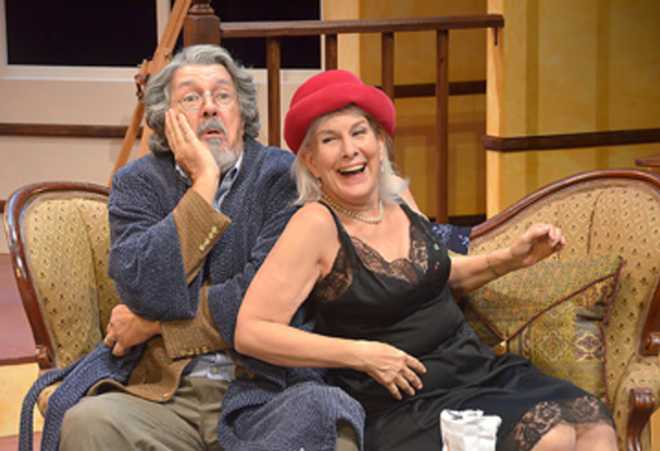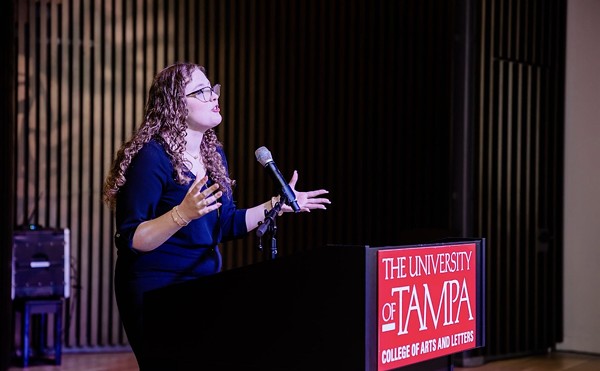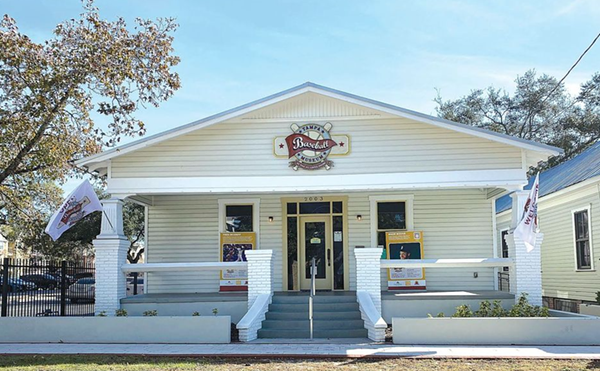
Two new productions have just opened at the FSU Center for the Performing Arts in Sarasota. One’s worth your time, and the other’s not.
The concept that makes Painting Churches more than haphazard is this: just as Margaret (“Mags”) Church is rendering her parents on canvas, playwright Tina Howe is rendering the whole Church clan on the stage. The first portrait is the less important one: father Gardner in a tuxedo and mother Fanny in a fine black evening dress, two Boston Brahmins at their elegant best. But what goes on onstage is something else altogether — Gardner is struggling with Alzheimer’s disease, while Fanny, his keeper, turns everything serious into a desperate joke. And here Mags shows herself as a generally neglectful daughter, consumed by her career and harboring old and powerful resentments. It’s these real Churches that we meet as we wait for Mag’s painting, and it’s these real Churches whose pathos finally makes the play matter.
There’s not much plot. Gardner and Fanny Church are preparing to move from Beacon Hill to Cape Cod, and Mags has arrived to paint their portrait before they go. As Mags sets up, we learn a few details. Gardner is a Pulitzer Prize-winning poet whose mind has so deteriorated that all he can write now are the first stanzas of famous poems he intends to criticize in a book he’ll never finish. Fanny is his wife and caregiver, sometimes pretending not to notice Gardner’s nonsensical behavior, at other moments giving way to shouting and not-so-gentle remonstrances. Mags, finally, is a New York-based portraitist who’s about to have a show at the chic Castelli Gallery, and who still hasn’t gotten over her six months’ banishment from the family dining room when she was a child. Put these three together and you get not order but chaos — and in fact, much of the time, Painting Churches seems to be going nowhere. This could be a fatal problem; but it dawns on us finally that this chaos is the reality, that this misshapen thing is here in its truest shape, and that this mess is the Church family, brought to us authentically. It doesn’t hurt that there’s humor, too, and some beautiful writing (as well as quotes from some great poems).
And it also doesn’t hurt that two of the three performances in the Banyan Theatre production are tip-top. As Fanny, Jenny Aldrich is entirely convincing: she’s smart and sassy and she’ll find a joke in the miasma of her married life if she possibly can. What’s particularly winning about Aldrich is how she transforms from a seemingly ditzy, self-absorbed woman to a real angel in the late scenes, devoted to helping her damaged husband. As that husband, Don Walker is wonderfully goofy: gentle, infatuated with poetry, and confused about everything except the call of another Dubonnet. Thanks to Walker’s able performance, we can easily believe that Gardner once hobnobbed with Robert Frost and Andre Malraux, but that now he can barely manage to carry a manuscript from room to room without some calamity.
Olivia Williamson as Mags could be more believable as an artist — she lacks inwardness and self-conflict, and also has a disturbing habit of addressing the audience when she speaks to her parents. Melliss Kenworthy’s direction is excellent, however — she doesn’t stint on the anarchy — and Chris McVicker’s gorgeous set of the Churches’ upscale living room could hardly be better. The actors are costumed persuasively by Ross Boehringer, and the fine lighting is by Joseph P. Oshry. Steve Lamke’s sound design features some lovely Chopin.
I wish that some of the confusion in Howe’s play were more telling; at times the randomness feels little more than arbitrary. But by the end of the evening, I was moved and enlightened. There’s something truthful in this play, about people, about portraits. By the final curtain, that truthfulness resonates.
The Asolo Rep's My Brilliant Divorce is a moderately amusing, not very original one-woman show without a single new insight on divorce, marriage, sex, parenthood or dating. After seeing this subject treated endlessly in plays, movies, novels and TV shows, one hopes that a fresh work will take an unusual perspective. No such luck. Author Geraldine Aron has a nice sense of humor (but not nicer than most of the other writers in this arena), and actress Mary Testa does a fine job impersonating middle-aged “Angela Kennedy Lipsky,” whose husband leaves her for a younger woman. But it’s oh so familiar: the shock of the separation, the resentment, the coming to terms, the ministrations of friends, the blind dates with the inadequate new lovers… Watching this show is like seeing pieces of An Unmarried Woman, The Mary Tyler Moore Show, Sex and the City, and 20 more otherwise-forgotten presentations. It’s baffling that this 90-minute cliché ever reached the Asolo stage.
The play starts when Angela’s husband informs her that “our marriage has been emotionally dead for many years,” and leaves to hook up with his much younger Argentinian lover. At first Angela is relieved — she’s free! — but then she panics. Her mother assumes that the fault is Angela’s own, her daughter informs her that she’s moving in with her boyfriend, and to her own surprise, she finds herself calling a suicide helpline. There are searches for new men in the personals, difficulties in buying a vibrator, the discovery of love notes from her ex-husband to his darling Rosa. The problem isn’t that we’ve seen this precise story before; the problem is that we’ve seen dozens like it. And Michael Donald Edwards’ fine directing makes not a bit of difference.
We want more from the live theater: more than another predictable dissection of a break-up.
Local Heroes. Bay area favorites Gavin Hawk and Ricky Wayne will be appearing at the 5th Annual Sarasota Improv Festival on Fri., July 12 at 8 p.m. at the Florida Studio Theatre Cabaret (and offering a workshop on July 13). Hawk & Wayne join 15 other improv groups from around the country. Call 941-366-9000 for tickets, or go online at floridastudiotheatre.org.


















